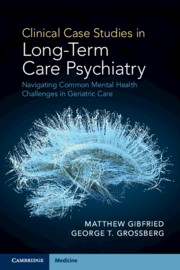 Clinical Case Studies in Long-Term Care Psychiatry
Clinical Case Studies in Long-Term Care Psychiatry Generalized Anxiety Disorder
Published online by Cambridge University Press: 31 October 2024
It is not uncommon for a resident to try multiple medications to manage anxiety disorder before finding a tolerated and effective psychotropic. An SSRI or SNRI are usually the first-line agent for pharmacotherapy. Concern for anxiety is often brought up by caregivers when patients demonstrate disruptive behaviors related to anxiety such as yelling out, resisting care, becoming frightened with personal care, and repetitive behaviors such as pushing a call light many times a day, pacing, or restlessness. First-line agents in the treatment of anxiety disorders in long-term care include SSRIs and SNRIs. Second-line agents or supporting agents may incude buspirone, mirtazapine, propranolol, and trazodone. Avoid benzodiazepines and anticholinergics. Strategies to address difficult to manage anxiety include reconsidering the first-line agent for appropriate dose and duration, adding an augmenting agent, switching from an SSRI to and SNRI, and considering the possibility of low-grade psychosis and a potential contributing factor to anxiety.
To save this book to your Kindle, first ensure [email protected] is added to your Approved Personal Document E-mail List under your Personal Document Settings on the Manage Your Content and Devices page of your Amazon account. Then enter the ‘name’ part of your Kindle email address below. Find out more about saving to your Kindle.
Note you can select to save to either the @free.kindle.com or @kindle.com variations. ‘@free.kindle.com’ emails are free but can only be saved to your device when it is connected to wi-fi. ‘@kindle.com’ emails can be delivered even when you are not connected to wi-fi, but note that service fees apply.
Find out more about the Kindle Personal Document Service.
To save content items to your account, please confirm that you agree to abide by our usage policies. If this is the first time you use this feature, you will be asked to authorise Cambridge Core to connect with your account. Find out more about saving content to Dropbox.
To save content items to your account, please confirm that you agree to abide by our usage policies. If this is the first time you use this feature, you will be asked to authorise Cambridge Core to connect with your account. Find out more about saving content to Google Drive.